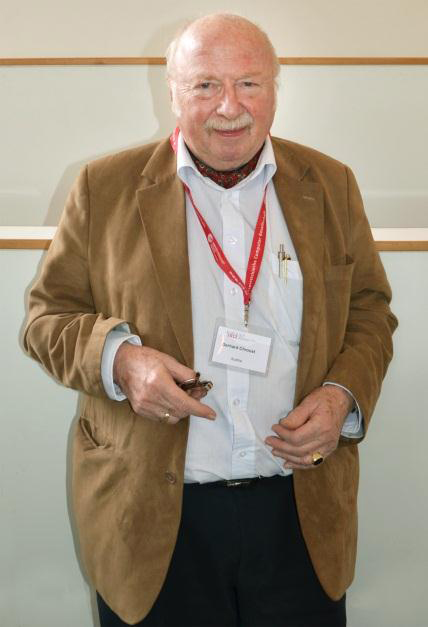IFSR Newsletter 2012 Vol. 29 No. 1 September

Secretary-General Message 2012: Gerhard Chroust, IFSR Newsletter 2012 Vol. 29 No. 1 September
I am proud to be trusted with the function of the General Secretary of the IFSR and enjoy the work it entails, a position I hold since 1993.
I think the past two years have been very successful:
- Robert Trappl having stepped down as the Chairman of the EMCSR (after 20 successful conferences in Vienna) posed the danger of discontinuing the very successful EMCSR conferences. I was fortunately able to negotiate and convince Wolfgang Hofkirchner to accept the Conference Chair. The 2012 Conference became a great success, partially also due to Stefan Blachfellner, one of our Vice Presidents.
- In the week of April 9th to 13th, 2012 (during the EMCSR Congress in Vienna) we held our General Assembly (with the election of the new Executive Committee). A key decision was the introduction of electronic voting for our members in order to enable a continuous influence on the operation of the IFSR.
- We cooperated with the EMCSR by sponsoring the Ross Ashby Lecture and by paying the conference fee for several participants.
- We held a “Reflective Meeting” organized by Leonie Solomons and moderated by Stuart Umpleby for discussing aspects of the future of the IFSR, in which approximately 20 persons took part.
- We participated in the meetings of the IASCYS – which in April 2012 had elected a new President: Robert Trappl
- In the following week (April 14-19) we organized and held the 16th IFSR Conversation in St. Magdalena, Linz (Austria). A separate chapter of this Newsletter is devoted to this event.
- We have established close relations with two other international federations, the UES/EUS (Union Européenne de Systémique) and the WOSC, (World Organisation of Systems and Cybernetics). Consequently I took part in the UES Congress on October 19th – 23rd, 2011 in Brussels. In a meeting between with Matjaz Mulej (then president of IASCS), Pierre Bricage (Secretary General of IASCYS), Andrée Piecq (Secretary General, now President of the UES/EUS), Raul Espejo (Director General of WOSC), Wolfgang Hofkirchner (President of the Bertalanffy Center for the Study of Systems Science (BCSSS) and Chairman of the EMCSR 2012), and me we discussed cooperation between our organizations. We noted that despite their internationality the organizations have differing language preferences: UES (French), WOSC (Spanish), and IFSR and BCSSS (English). We consider this as a chance for expanding and improving our international cooperation by catering for members with different language preferences.
But I can also observe that the IFSR has to undergo some significant changes again. To me those most crucial for the next two years are:
- Reacting to the new challenges of electronic voting (“anytime voting” instead of once every two years), and the establishment of appropriate procedures for handling this.
- Intensification of the communication with our member societies: we need easier access and faster interaction between our members. I hope this can be achieved by the introduction of an improved web-site with blogging facilities, in order to improve attractiveness and speed of communication.
- Overcoming the ‘English-only’ interface of the IFSR towards its members and the general public, better catering for the Spanish and the French speaking system ommunities. I hope that the cooperation with UES and WOCS will help in this area.
- Increase of IFSR’s visibility due to intense international connections with other international organizations.
- Increase of IFSR’s interaction and cooperation with the IASCYS and it’s new President.
- Establishment and strengthening of the IFSR as an archival centre for systems literature and know-how (see Chroust, G. and Drack, M. and Müller, K. H.: Vienna – The
Systems Archive – Dream or More? in: Trappl, R. (ed.): Cybernetics and Systems 2008, Proc. Of EMCSR, OSGK Vienna 2008, pp. 595-599, ISBN 978-85206-175-7). - Gaining more powerful impact on technical fields of Systems Engineering where the need for knowledge of Systems Sciences is growing. I hope that INCOSE, our new member, will prove be instrumental in this respect. The IFSR Conversation 2012 (Team 4) has already paved the way for closer cooperation.
All these activities need the support of more than only the members of the Executive Committee: It requires involvement from all of our member societies, in order to provide for improved service from which our member societies and the systems community in general
will profit greatly.
Gerhard Chroust
Gerhard.chroust@jku.at
